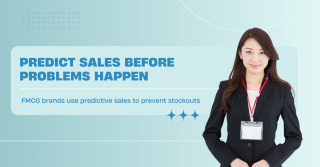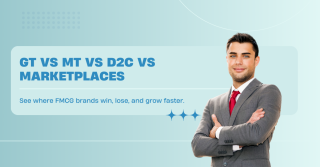Scaling Up Your FMCG Business: Key Strategies for Growth And Success
_1733655943.png)
Scaling an FMCG (Fast-Moving Consumer Goods) business is a significant milestone for startups and medium-sized companies. With the market's dynamic nature and fierce competition, achieving sustained growth requires a blend of robust planning, strategic execution, and innovative tools. This blog delves into actionable strategies to grow your FMCG business and highlights how Delta Sales App can help you streamline processes, boost efficiency, and scale operations effectively.
Understanding the Challenges in Scaling an FMCG Business
Scaling an FMCG business presents unique challenges, such as establishing a distribution network, ensuring product visibility, managing sales teams, and staying ahead of market trends. Key hurdles include:
-
Limited access to the market in rural and semi-urban areas.
-
Inadequate sales team management and motivation.
-
Poor visibility and awareness of products in retail outlets.
-
Challenges in executing trade schemes and monitoring their impact.
-
Ineffective sales tracking and process monitoring.
To overcome these challenges, a systematic approach is essential. The strategies discussed below are tailored to address these pain points and set your FMCG business on a growth trajectory.
Key Strategies for Scaling Up Your FMCG Business
1. Build a Strong Sales Infrastructure
A strong sales infrastructure forms the backbone of any FMCG business. This involves establishing a seamless supply chain and distribution network.
a. Develop a Network of Super Stockists, Distributors, and Sub-Distributors
-
Super Stockists: Handle bulk inventory for large regions, reducing logistics complexities.
-
Distributors: Act as intermediaries to supply goods to retail outlets.
-
Sub-Distributors: Help penetrate rural and semi-urban markets with smaller distribution points.
Why is this Important?
Without an efficient sales infrastructure, reaching retail outlets is challenging. A well-structured network ensures product availability across regions, enhancing market reach and sales volume.
b. Optimize Inventory Management
Maintaining the right inventory levels is critical to avoid stock-outs or overstocking. With proper infrastructure, you can manage inventory effectively to meet demand without unnecessary costs.
2. Recruit and Train an Effective Sales Team
Your sales team drives the execution of your growth strategy. Investing in the right talent and training can significantly impact your sales performance.
a. Recruit the Right People
-
Hire individuals with experience in the FMCG sector and knowledge of your product category.
-
Look for team members with an understanding of local markets and consumer behavior.
b. Train and Motivate Your Team
-
Provide regular training to improve product knowledge and selling skills.
-
Set realistic sales targets and offer performance-based incentives to motivate your team.
c. Monitor Performance
A well-trained team will underperform without proper monitoring. Tracking KPIs like sales volume, territory coverage, and new customer acquisition ensures alignment with your business goals.
3. Focus on Sales Support and Product Visibility
Sales support activities like trade promotions, product displays, and schemes play a crucial role in driving product demand and consumer loyalty.
a. Improve Retail Display and Visibility
-
Ensure your products are prominently displayed in retail outlets.
-
Use eye-catching branding materials like shelf talkers, standees, and banners.
Why is Visibility Important?
Consumers are more likely to purchase products they see prominently displayed. An attractive display helps in repeat purchases and fosters brand recognition.
b. Implement Trade Schemes and Consumer Offers
Trade schemes incentivize distributors and retailers to push your products, while consumer offers encourage purchases. Examples include:
-
Volume discounts for retailers.
-
"Buy One, Get One Free" deals for consumers.
-
Seasonal offers and promotions.
4. Develop a Robust Sales System
A scalable sales system includes well-defined processes and tools that enhance efficiency and execution.
a. Sales Process
Think of the sales process as the railway track on which your business runs. This involves:
-
Clearly defined steps for lead generation, conversion, and order fulfillment.
-
Standardized practices for distributor and retailer management.
b. Sales Tools
Sales tools streamline execution and monitoring. Examples include:
-
Mobile apps for order management.
-
CRM systems for customer relationship management.
-
Reporting tools for tracking sales performance.
How Delta Sales App Can Help Scale Your FMCG Business?
Delta Sales App is an all-in-one sales management solution designed to address the unique needs of FMCG businesses. It helps optimize every aspect of your sales operations, from infrastructure management to team productivity and visibility enhancement.
1. Streamlining Sales Infrastructure
Delta Sales App allows you to manage your sales network efficiently. Key features include:
-
Distributor and Sub-Distributor Management: Track inventory levels, orders, and payments in real time.
-
Retailer Management: Ensure product availability and improve retailer relationships through regular updates and communication.
2. Boosting Sales Team Productivity
An empowered sales team is essential for growth. Delta Sales App offers:
-
Route Optimization: Plan the most efficient routes for your sales team, reducing travel time and costs.
-
Performance Tracking: Monitor individual and team performance with detailed analytics.
-
Real-Time Updates: Provide your team with up-to-date market insights, sales targets, and product information.
3. Enhancing Product Visibility and Sales Support
Delta Sales App helps ensure your products stand out in the market:
-
Photo Reporting: Sales reps can upload images of retail displays, ensuring compliance with visibility standards.
-
Scheme Management: Run trade schemes and consumer offers seamlessly, with real-time tracking of performance and ROI.
4. Implementing and Monitoring Sales Processes
Delta Sales App simplifies sales process management by:
-
Automating Workflows: Streamline order processing, invoicing, and delivery tracking.
-
Custom Reports: Generate detailed sales reports for better decision-making.
-
Inventory and Stock Tracking: Monitor inventory levels and movement to avoid stock-outs or overstocking.
Case Study: How Delta Sales App Transformed an FMCG Business?
Background: A mid-sized FMCG company struggled with distributor management, poor visibility, and inconsistent sales team performance.
Challenges:
-
Inefficient sales tracking and reporting.
-
Lack of visibility into distributor and retailer operations.
-
Limited insights into the effectiveness of trade schemes.
Solution with Delta Sales App:
-
Implemented real-time tracking of distributor orders and payments.
-
Enabled sales reps to report retail display compliance through the app.
-
Streamlined trade schemes and measured their impact.
Results:
-
30% improvement in sales team productivity.
-
25% increase in product visibility and shelf space.
-
Enhanced distributor satisfaction due to better communication and support.
Conclusion
Scaling an FMCG business requires a comprehensive strategy that focuses on building a strong sales infrastructure, recruiting a capable team, enhancing visibility, and implementing a robust sales system. While these strategies provide the framework, tools like Delta Sales App make the execution seamless and efficient.
Delta Sales App helps you monitor, manage, and optimize every aspect of your FMCG business, ensuring sustained growth and profitability. Whether you're looking to expand into new markets or improve your current operations, Delta Sales App is your trusted partner in scaling up your business.









